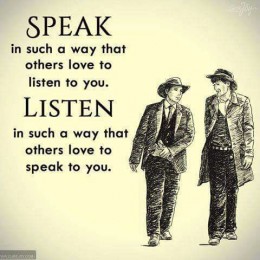 In the last two postings I have highlighted the place for the ears and the eyes as means of listening. Now I will come to the third, the mouth.
In the last two postings I have highlighted the place for the ears and the eyes as means of listening. Now I will come to the third, the mouth.
Your mouth is also an important part of communication of course, but how can it help you to listen? There are a number of ways your mouth can help you listen but the most important is to know when to keep it shut!
Shut up
What do you feel about silence? Does it embarrass you? Somehow it makes you feel vulnerable as you either don’t know what to say or because you feel awkward for the other person as they gather their thoughts. The temptation is to fill it with your own talk. This is particularly true of the extrovert who does much of his thinking through conversation. The introvert, in contrast, likes time to think things out before speaking.
If you are in a serious conversation there are times when a slightly embarrassing silence is necessary; to intrude may stop the other person making any response. Maybe you have asked an important question. If you do not allow sufficient silence to force the person to give an answer you will never get to the truth.
Many years ago I was interviewing some candidates for a job. There were two of us carrying out the interviews and my colleague could not bear silence. The result was that whenever I asked a question if the answer was not immediately forthcoming from the candidate my colleague would suggest an answer, which of course the candidate agreed with. By the end of the interviews I knew more about my colleague than any of the applicants!
Empathise?
I am sure you have all been in situations where someone is sharing their heart with you, or bringing some unpleasant news of, perhaps, illness. This is not easy for them or for you, and it needs physical and auditory ‘space’ not to be interrupted.
Since my son had a serious motor-cycle accident many years ago I feel I have more understanding of how someone feels when they experience trauma. I will often go out of my way to speak to someone whom others avoid out of embarrassment of not knowing what to say. But I will make it clear that I am prepared just to listen – I will probably not have any ‘good advice’ to offer.
Beware your own story!
But it is possible in such circumstance to ‘blow it’. Because of your slight embarrassment and not knowing quite what to say you may be tempted to find something in your own experience that has similarities to the situation you are learning about and to share this in detail. That way you try to empathise. But no two situations are ever exactly the same and sharing your experience may be very unhelpful; you may be blocking someone from digging deep in order to share their problem. Better just to keep silent, or use you mouth to say ‘No hurry, take your time’. Rather than taking the risk of shutting down the conversation you thus open up space for the speaker to speak when he or she feels able to do so.
Affirmation
I may appear to be saying ‘keep quiet and let the other person do all the talking’. Clearly context and topic of conversation affect whether this is the right approach, but I tend to veer towards saying less rather than more. But there are times when ‘hearing with your mouth’ does require you to use your voice, even in difficult or critical situations. An affirming nod or ‘grunt’, or a confirming statement ‘so what you are saying is…’ can go a long way to assuring the speaker that you are engaged with him and are hearing what he is really saying.
Conclusion
Much has been written elsewhere about Listening Skills and this brief series clearly cannot cover all situations and circumstances. In contexts such as counselling these skills are particularly important and there are others far better qualified than me to teach on this. But I hope that I have been able to give a few keys I personally have found helpful in my own experience and that as you apply them you will become a better listener. I find few things more encouraging than when someone says to me ‘you are a good listener’. May you know that encouragement too.
Maybe you would like to reflect on this cartoon (source unknown).

This is the final posting in this series. It seems an appropriate place to end my blog-year as we are about to celebrate the incarnation, the Word made flesh. May this be a great season of joy and celebration for you, and my prayer is that as you go into the New Year you will be a better listener – to both God and man. Happy Christmas!
